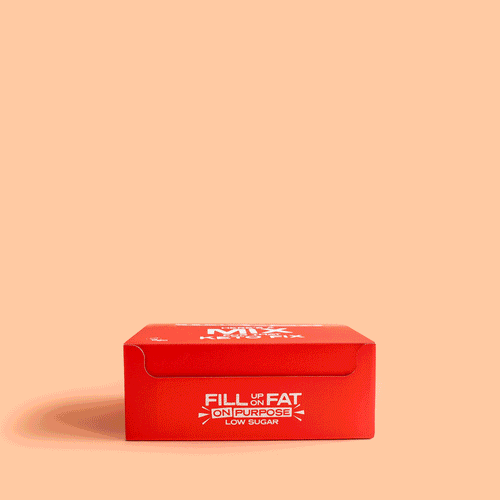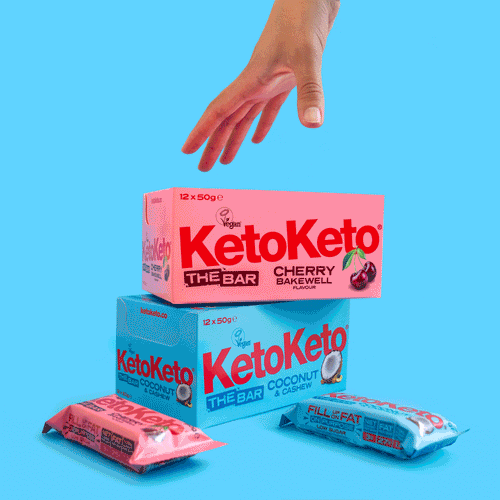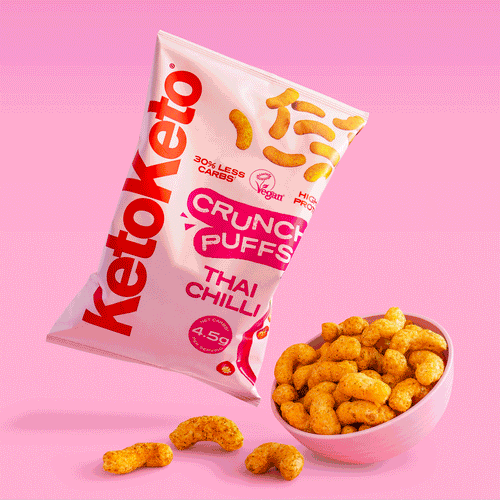If you know anything about Keto, you’ll know it’s a low-to-no carbohydrate diet. The Ketogenic diet promotes a high-fat, moderate-protein eating plan but tightly restricts your consumption of carbs (less than 5% of your daily calories).
In effect, this means you’ll greatly reduce the amount of sugars you consume. So what can you do when you crave a little sweetness while following a Keto diet? Will you forever have to ban sweetness from your life?
Thankfully, no. There are low-carb sweeteners around that can add a treat to your Keto diet every now and then. The quandary is choosing the right one to keep your body in balance and healthy.
So what are the best and worst sweeteners for your Keto diet? All that and more here...
Why Is Sugar Bad News On The Keto Diet?
It’s all to do with your metabolic state. On Keto, your aim is to stop your body using glucose for fuel so you can burn fat instead, aka ketosis. Sugar raises your blood sugars and you’ll soon be kicked out of ketosis even if you’ve maintained it for some time already. It only takes a tiny bit of sugar to pull you away from progress.
0-5% of your daily calories can be carbohydrates, but that doesn’t mean sugar-laden foods are permissible. Even that small proportion must be made up of Keto-friendly carbs that have a low GI (Glycaemic Index), which means they slowly affect your blood sugars rather than cause a spike. The only fruits allowed are berries and the only carbohydrates for consumption are those with relatively low sugars which are also nutrient dense.
Foods high in sugars with a high GI will flood your system with glucose. You’ll experience a blood sugar spike and your body will step out of ketosis. Your body will quickly use the sugars for fuel rather than burn fat for ketones.
What’s The Difference Between Sugar and Sweeteners?
There are many differences between sugar and sweeteners when it comes to their chemical compounds, with variations not only between them but within the sub-types. But the main difference that’s relevant to you is how they impact your calorie consumption and blood sugar levels.
Sugar is another name for nutritive sweetener and contains carbohydrates and calories. Sugar can present under the name of glucose, fructose, sucrose, maltose, honey or syrup. These types of sugar with their high concentration of carbs and calories, greatly and quickly impact your blood sugars.
Another type of nutritive sweetener are polyols, or better known as sugar alcohols, or sweeteners, for short. The names of these types of nutritive sweeteners are erythritol, isomalt, maltitol, mannitol, sorbitol and xylitol. Sweeteners contain carbohydrates and calories, but far fewer gram for gram compared to sugar, with some only having negligible amounts. Thus sweetners do not impact your blood glucose levels as much as sugar does.
It’s also true that some sweeteners have a much sweeter taste than sugar. So far less sweetener is required to enjoy the same level of sweet taste compared to sugar; helping to reduce the effect on your blood sugars and the number of carb calories you consume.
With their low carb content and GI scores, sweeteners are a brilliant sugar substitute for those of you following the Keto lifestyle. You can enjoy the taste of a sweet treat when you fancy, without undoing your hard work.
Our bars are made to help curb cravings and keep you fuller for longer. With only 3g of net carbs per bar, they’re the
perfect Keto snack for anytime during the day. Save more when you buy more, by taking advantage of our Box Combo deal. Pick your favourite flavours or try a new
flavour for a change.
The KetoKeto Box Combo
What Are The Best Keto Sweeteners?
With so many different types of sweeteners available, are they all made equal? The truth is, no they are not. Some sweeteners are ideal for complementing your Keto diet, while others can do you more harm than they’re worth. So which sweeteners are best for Keto? Here’s out top three:
#1 Erythritol
Doesn’t get in the way of weight loss, with zero calories you won’t blow your calorie allowance with a treat made up with erythritol.
Keeps you in ketosis because your body doesn’t metabolise erythritol. Which basically means your body cannot digest the erythritol and it will leave your body unchanged through your urine. No blood sugar level spikes or crashes, no change in insulin production no impact on triglyceride levels and no cholesterol formation.
As natural as fruit and veg since erythritol is found naturally in a variety of fruit and veg such as mushrooms, melons and grapes! You can be sure your body is as well looked after on the inside as it is on the outside.
Promotes good health with it’s antioxidant effects that can help to slow down and repair cell damage.
Tastes as good as sugar with 60-80% of the sweet taste of sugar. You can stay on track with Keto with this naturally derived sweetener that tastes phenomenal and handles your sugar-craving when you need it.
#2 Xylitol

Naturally derived from the woody part of corn on cob and other fibrous plants. You can be sure it doesn’t contain any nasty artificial chemicals that might negatively impact your health.
Helps maintain ketosis with its low calorie content and sugar alcohol constitutuion. It has little impact on your blood sugar levels so you can stay true to Keto.
As sweet as sugar, your really won’t be able to tell the difference in taste thanks to xylitol having the equivalent sweetness as white granulated sugar.
Use sparingly though since your body can process around 50% of xylitol. Therefore it can cause a slight increase in the production of your insulin levels and may kick you out of ketosis if you go all-in on the sweet treats.
#3 Stevia
Natural and plant-based, derived from a shrub native to South America making it a healthy sweet option.
Very keto-friendly with its low-to-no calories. Much like erythritol, Stevia has very little effect on your bllod glucose or insulin levels so it’s a safe sweetener to keep you in ketosis.
Sweeter than sugar with a level of sweetness 200-300 times stronger than white sugar. It’s incredibly sweet which means a little goes a long way. Helping you to enjoy a treat with very little impact on your carb intake.
Be cautious of appetite though, stevia has been known to increase hunger. This could set you back on your weight loss journey if you use it as a regular sweetener option.
What Sweeteners Should I Avoid On Keto?
As already mentioned, not all sweeteners are the same. While most if not all of them claim to be sugar-free and zero calories, this doesn’t mean they’re healthy or ideal for the Keto diet. Some sweetners such as those derived from artificial sources can cause adverse side-effects such as digestive issues, while others can be fully metabolised and are more likely to raise your blood sugar levels.
Here are some sweeteners you ought to avoid on Keto:
- Maltitol
- Lactitol
- Aspartame
- Saccharin
- Sucralose
Safe Sweetneners For The Keto Diet
When you crave a little treat on the Keto diet it can be extremely tempting to give in to carb-full foods. But you don’t have to. There are plenty of sweetener options out there that will not add to your carb intake or push you out of ketosis.
Some are definitely better than others, and our top choice for our KetoKeto products is erythritol. It looks after your health with it’s naturally derived ingredients, antioxidant effects and no impact on your blood glucose or insulin levels. It’s the star of Keto sweeteners.
Xylitol comes close to the top spot, and Stevia is a safe sweetener choice when the other two are unavailable.
Looking for some Keto-safe sweet treat recipes? Check out our Keto Baked Banana Cinnamon Donuts or Vanilla Frozen Cheesecake Bites.







